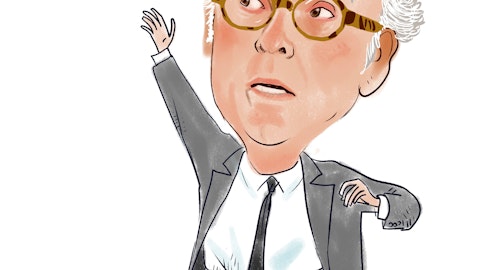Tim Trenary: Gary, with respect to your first question, I’m looking at my notes and we can back into the number, because in my comments, my prepared comments, I made reference to how much of the loss was associated with the restructuring charges in the first half of the year. Bear with me just one moment please. There was $23 million restructuring charges associated, $23 million of that total is associated with 2023. And you can think of the rest of that is bleeding in ‘24.
Gary Prestopino: And then in terms of — again, I know you don’t give quarterly guidance, but I think it would be very — it’s pretty important here that we set the expectations in line with where you think you could be given all the noise in the numbers. So is it fair to say that we would see maybe flat sequential EBITDA, slightly up, slightly down? Can you just give us an idea of how we should frame that?
Majdi Abulaban: I’m going to give you an idea. It’s very fluid, because of all that’s going on with the business. What do I mean by this? Our financial results for the first half of the year are going to be very fluid, because of the additional cost of completing the transformation in Europe and also the negotiations that we’re undertaking with the customers. And so to sort of demonstrate how you might think of the year evolving quarter-to-quarter, if you think about — I’m using the midpoint of the guidance of $165 million for the year and then our comments exiting the year of the business generating, let’s say, $190 million of EBITDA. What that means is that there’s a ramp during the year, because of the cost coming out and presumably the additional wheel price that’s coming in.
That ramp starts very, very modestly in Q2 and gathers steam in Q3 and Q4. So I’m not prepared to give you an exact number, because I don’t know how the number is, because it’s so fluid. But the way I sort of model it is that I see the first quarter and second quarter being somewhat higher sequentially than it was in the fourth quarter, but not dramatically so.
Operator: Our next question come from the line of Mehmet Dere from Deutsche Bank.
Mehmet Dere: Just on the relocation to Poland, as you guys are looking for completion in Q1. Is there any risk for a delay or are you — is there a risk for any legal consequence for you guys which could potentially negatively impact that?
Majdi Abulaban: Mehmet, there’s always a risk, right, but I would tell you that our customers are in with us. We have a team that has executed on this very, very well. Most of that product has already been relocated to Poland. Our legal team has been on it, been dotting the I’s and crossing the T’s. There is risk but it’s minimal there, Mehmet. We feel good about where we’re at.
Mehmet Dere: Just on — I know that you guys are in the early process of the refinancing, because there was a comment that you expect basically a ramp up starting in Q2 and more coming in H2 ’24. Can you give us some color on the timing of the potential refinancing, is it more expected towards the second half of the year? That’s the first question. And you are mentioning that the preferred equity to be a part of the process and also mentioning the notes, but you are not mentioning the term loan. Can we assume that the term loan is going to stay there in place or what are the plans there?
Tim Trenary: So the final construct of the company’s capital structure coming out of this process is TBD to be determined yet. We are fairly early in the process with our financial advisor exploring the capital markets. The term loan facility that we put in place 14 months ago now, internally, we use a term called — we use the term durable. The facility, to the extent it was practicable to do so, along with the revolving credit facility, was pre-wired. In other words, it contemplated the refinancing of the senior unsecured notes to the extent we could do so within certain ranges. So the lenders, Oaktree and the three banks, JP Morgan, Bank of America and Deutsche Bank, within certain limits allow for the company to go out and place additional debt to address the rest of its balance sheet.
So the term loan doesn’t necessarily have to change. That doesn’t mean that it won’t change, it may change. But it has been pre-wired so that it contemplated that we will be undertaking this exercise. In terms of when this exercise might be complete. As I said, we are on our way, it’s early in the process. We’re probing the capital markets and we shall see. There will, I think, not necessarily of necessity, but there will likely be incorporated in this process a change one or more changes into the TPG, the preferred equity securities. So that will be a part of this exercise. Having said all of that, the company’s intention is to address the senior secured notes timely. We would very much prefer they not go current. So our intent is to complete this refinancing before the notes go current.
Mehmet Dere: On the inefficiencies and the UAW strikes, you have already given an EBITDA guidance for [2/24]. And what I want to ask is, is there any upside potential to what you have already guided given also ongoing discussions with the OEMs as well or expecting any unwinding from the challenges you have seen due to the strikes and the inefficiencies?




